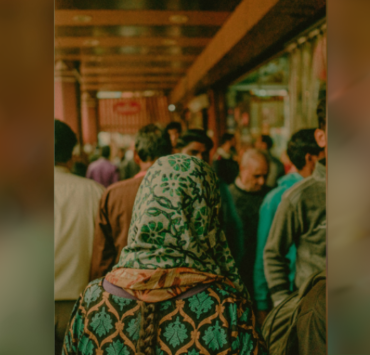
By Urvashi Sarkar

A mere handful of women are in top positions in politics and government across the world. According to recent data published by the United Nations, just 18 countries have a woman Head of State, and 16 countries have a woman Head of Government.
“I think what the world is suffering from is too much male leadership,” said Ireland’s first woman president, Mary Robinson, who served from 1990 to 1997. “We need 50 per cent of the governments to be women-led and that would help all the discussions at global level. The best leadership is when there is a balance between women and men because we bring different perspectives, different experiences,” Robinson said during a recent visit to India.
Robinson feels that “a woman’s way of leading” is essential in a fractured world. What is a woman’s way of leading? Can specific values be ascribed to female leadership which make it distinct from a male brand of leadership? The evidence is mixed, with women leaders holding an entire range of views from progressive to reactionary and the spectrum in between.
For example, Italian Prime Minister Giorgia Meloni, a conservative, has strengthened anti-abortion lobbies in Italy and increased stigma around the practice. Meloni was also instrumental in dropping the clause on safe and legal abortion from a statement of G7 countries.
German politician Alice Weidel is a study in contrasts. Weidel, who is gay and has a Sri Lankan partner, is a prominent member and leader of Germany’s far-right Alternative for Germany (AfD) party, which opposes same sex marriage and takes a belligerent position on immigration. “Burqas, headscarf girls and subsidised knifemen and other good-for-nothings will not secure our prosperity, economic growth and, above all, the welfare state,” Weidel said with reference to immigrants.
Angela Merkel was Germany’s first female chancellor, a position she would occupy for 16 years. Merkel was labelled a ‘reluctant feminist’ – one of the grounds on which her legacy is examined is whether she did enough for women. Merkel would concede she was a feminist only at the very end of her term. Women leaders are willy-nilly judged on whether they did enough for their own kind, a criterion which would be unheard of for men to be subjected to.
Closer home, Rekha Sharma, former chairperson of the National Commission of Women who is now a member of the Rajya Sabha (upper house of Parliament), accused wrestler Vinesh Phogat of lying to enter politics (she is a member of the Haryana Legislative Assembly, having won a seat in the 2024 state polls). Phogat, an internationally acclaimed wrestler, was one of several women who accused Wrestling Federation of India chief Brij Bhushan Sharan Singh of sexual harassment. This is not the only instance where Sharma blundered by being less than supportive to survivors of sexual harassment.
In contrast, former Prime Minister of New Zealand, Jacinda Ardern picked a diverse cabinet with representation from women, people of colour, the LGBTQ+ community and indigenous MPs. Ardern made history as the first female leader to bring her baby to the General Assembly of the United Nations in 2018. Ardern was also the first New Zealand PM to march in a gay pride parade the same year. Ardern is admired for being compassionate and kind. Her government’s response while tackling COVID-19 invited a mix of plaudits and criticism.
Her decision to resign as Prime Minister generated surprise and shock. While many praised it as a selfless act and as an example of how politicians should conduct themselves, there was also speculation about whether or not Ardern crumbled under the pressure of misogyny and online hate. The BBC reported her resignation in an article with a controversially titled headline, ‘Can Women Have it All?’ – which the broadcaster later withdrew and republished with a different title.
Mexico’s first female President, Claudia Sheinbaum, who is Jewish, made headlines for extending a warm welcome to Palestinian ambassador Nadya RH Rasheed. Sheinbaum is the country’s first female president in more than 200 years of independence. She has stood out for her adroit diplomacy with Donald Trump, ensuring that Mexico neither fawns over nor is in the bad books of the US President. A climate scientist, she was also part of the UN Intergovernmental Panel on Climate Change team that shared a Nobel Peace Prize with former US Vice President Al Gore in 2007.
In South Asia, leaders like Indira Gandhi of India and Benazir Bhutto of Pakistan have left defining legacies despite their chequered records. In Bangladesh, the now ousted Prime Minister, Sheikh Hasina of the Awami League and Khaleda Zia of the Bangladesh Nationalist Party – who served as PM thrice – have been the most popular contemporary political leaders of the country. Both regimes have been accused of corruption and nepotism.
In 2024, Harini Amarasuriya was elected Prime Minister of Sri Lanka, making her the first woman to hold this position in 24 years. Sirimavo Bandaranaike was not just Sri Lanka’s first female Prime Minister but also the world’s first woman to hold such a position when she took office in 1960. Then, in 1994, Chandrika Bandaranaike Kumaratunga was elected Sri Lanka’s President, a position she held till 2005. She is Sri Lanka’s longest serving President and survived an assassination attempt in 2000.
There have been prominent female political leaders in other parts of the world, too. In March 2025 Sara Zaafarani became the second woman Prime Minister of Tunisia, following Najla Bouden, who took office in October 2021. In June 2024 Judith Suminwa became the first woman in the history of the Democratic Republic of Congo to assume the role of Prime Minister.
Ellen Johnson Sirleaf, the first female democratically elected head of state in Africa, became President of Liberia in 2005 and remained in the post till 2018. She was awarded the 2011 Nobel Peace Prize, along with two other women, Leymah Gbowee and Tawakkol Karman, for their non-violent efforts to promote peace and her struggle for women’s rights. Widely known as Africa’s Iron Lady, she led Liberia through reconciliation and recovery following the country’s decade-long civil war and the Ebola health crisis.
Michelle Bachelet, twice President of Chile (2006-10 and 2014-18) is one the most widely recognised Latin American female politicians on the world stage. Dilma Rousseff of Brazil (2011-2016), Cristina Fernández de Kirchner of Argentina (2007-15, then Vice President 2019-23) and Laura Chinchilla of Costa Rica (2010-14), all elected Presidents of their respective countries, have left behind defining and powerful legacies.
History suggests that women-led regimes are not necessarily more or less peaceful, collaborative, or progressive than their male counterparts. In order to prove their mettle as heads of nations, women have needed to appear ‘strong,’ authorise warfare and command militaries. It is worth noting that several women leaders have been described as ‘Iron Lady” – most famously, perhaps, ‘Iron Lady’ Margaret Thatcher, but also Ellen Johnson Sirleaf (along with the women in her cabinet), Indira Gandhi and Golda Meir, the fourth Prime Minister of Israel and the first (and so far only) woman to hold the post (1969-74).
Women in general are traditionally considered more peace-loving, humane and caring than men. But such perceptions tend to essentialise gender values and reduce men and women to certain opinions and behaviours based solely on being male or female.
The issue at the heart of this is the exercise of power. When an individual is appointed to a country’s top executive post, power, responsibility and accountability come with it. Ultimately, they must be evaluated on their record on governance.
This is not to suggest that the gender of a head of state and government does not matter. The very idea of a woman at the pinnacle of government is powerful and inspiring. It is a message to society that younger women and girls need not settle for junior or middling positions at work and that it is possible for women to reach the very top. It is also a message to men that women cannot be dismissed or treated as inferior counterparts.
There is enough evidence to suggest that when women are represented in politics, there are positive spillover effects on health and education parameters, as well as on livelihood prospects for girls and women of the country and region. Women are needed in politics and government now more than ever. More women decision-makers are required to pave the way for gender justice and peace, as well as better outcomes in health, education, the environment and employment.
Urvashi Sarkar is an independent journalist who focuses on international politics, gender and culture.
Related reading:
Why India needs women in national security leadership roles
Mexico’s first female president Claudia Sheinbaum faces many challenges



